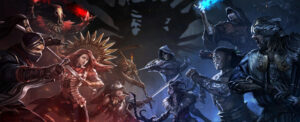A number of new previews dedicated to ArenaNet’s sequel to Guild Wars have surfaced recently, based on the second press beta weekend. We start with IGN who is offering their impressions after playing with the Elementalist and Ranger professions. A snip from the first:
The Elementalist requires a lot of work early on, but once you have all his powers unlocked for their various attunements they become rich and versatile characters. One second they can be blasting away at their opponents with fire spells, the next they can change to their water attunement and heal themselves and their party. All of their attunements have a damage dealing auto-attack, but they also have a general focus. Fire tends to be aimed at dealing heavy amounts of damage; water has healing spells; wind spells often harm an enemy’s resistance to damage; earth spells often do damage and also cause bleeding to an opponent.
Attunements can be rapidly cycled (though there is a short cool down on each to prevent you from going back and forth between only two), so a good Elementalist can easily use their entire arsenal of powers. You might open up with a wind spell to lower their damage resistance, then blast them with an earth spell to get them bleeding. Then, after pummeling an enemy with an exploding phoenix or a gigantic flaming dragon’s tooth from the fire spell set, they can switch to water to blast out an area of effect heal to keep everyone in the fight. Elementalists can also combo attacks with other professions like the Ranger. For instance they can cast a ring of fire, allowing the ranger to shoot through it to set their arrows alight.
IncGamers:
Aside from the personal storyline, PvE in this beta was all about ‘˜Heart Renown’ and dynamic events. The former seemed to consist of your standard ‘˜NPC needs something done’ activities, which tends to translate as killing a few hapless creatures. I wasn’t hugely impressed by these, as they suffer from the usual problem I encounter in MMOs; namely that your efforts seem to make no difference to the world whatsoever. Yes, I’ve chased off the bandits or the spiders in the orchid, or whatever, but the exact same enemies will be back in about five minutes and the same NPC will be asking for the same kind of help. This always undermines the effort put into creating believable scenarios and makes these mini-quests just seem like fairground rides, running indefinitely for a endless stream of punters.
Dynamic events were more engrossing (in part because they would tend to pull me away from Heart Renown activities). These events will (like the rifts in Rift) pop up in parts of the world and demand player attention. You might suddenly be called to protect pipes from bandit saboteurs, or to hold a dam against malicious swarms of harpies. It adds a nice sense of urgency to your questing, as well as a sense of camaraderie as players organise to prevent the threat. What I (sadly) didn’t get to see was what happened if these dynamic events failed. Had we failed to protect the dam, would it have been destroyed? My hope is that failure in these events has lasting consequences.
Massively offers “an outside look” into the game:
I should mention Guild War’s 2 UI presentation here. Wow! would be one reaction. Holy crap, that’s pretty! would be another, and even though I’m one of those guys who likes to drag, resize, and manipulate every aspect of an MMO interface, I didn’t much care that I couldn’t due to the drop-dead gorgeous art direction (and the logical placement of all the essentials). The aforementioned text chat is easily the most visually pleasing I’ve ever seen in an MMORPG; the windows appear and disappear with subtle animations capped off by brush-stroke buttons that give the whole enterprise a certain classical feel that’s hard to describe and easy to love.
The controls are pretty basic. If you’ve played an MMO before, you’ll feel right at home thanks to WASD, tab targeting, and a hotbar that mixes number and F-key presets. As a long-time Age of Conan player, I also appreciated ANet’s decision to let you roll and dodge via double-tapping your directional keys, and adding an endurance bar (so you can’t spam these movements willy-nilly) is a good call.
Like the interface, the game world of Guild Wars 2 is fairly stunning. It’s quite open, especially compared to the first game, and the megacity of Divinity’s Reach is the closest thing to an MMO version of Minas Tirith that I’ve seen to this point. There are some interesting smaller touches as well. The gathering animations are fun, and the game’s lack of a quest journal (and the associated drudgery that MMO quest journals inspire) was refreshing.
GamesBeat focuses on the title’s business model just as much as its gameplay elements:
There are a good number of veteran MMO role-playing games out there that are free to download. The Lord of the Rings comes to mind and now even the relatively new (and pretty) Aion is joining the free-to-play circus. But five minutes into Guild Wars 2 and you get why the developers think they’ll be able to demand 60 bucks. The visuals in Guild Wars 2 are ahead of the MMO competition. Compared to the cartoonish art style of WoW and SWTOR, the artwork here has a more realistic, detailed fantasy look with beautiful landscapes and some impressive character models.
SWTOR has spoiled us with the quality of its cinematic storytelling and interactive dialogs that allow players to directly influence how certain missions are resolved. Guild Wars 2 doesn’t seem to reach those lofty presentation heights with its (personal story) quests, but they bring a little extra drama to the game. As my character progresses, he can participate in an unfolding storyline that is told through voiced conversation scenes. I didn’t grow overly attached to Guild Wars 2’²s story characters and wasn’t able to pick my hero’s responses. But at the end of the first chapter, my Charr engineer got to select one of two weapon types to which a new technology would be applied. I haven’t been able to explore the long-term effects of such choices yet.
Finally PC Gamer reached out to publisher NCSoft about the discrepancy in price between the European and American collector’s editions. Here’s what they responded:
(Currency fluctuations, distribution costs, taxes and market conditions in addition to the cost of goods are all contributing factors when setting pricing. These vary dramatically between NA and EU and our pricing is competitive and adjusted accordingly.)






